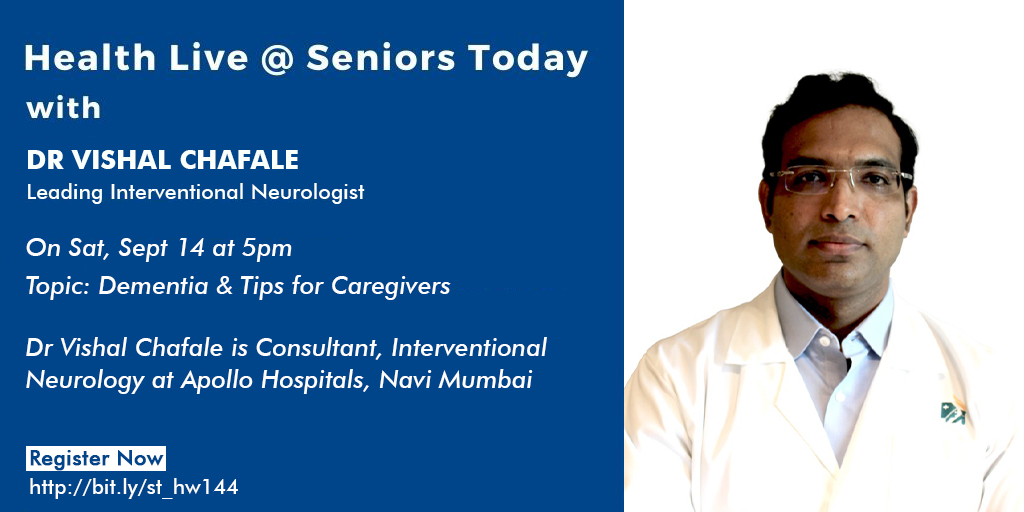Dr Vishal Chafale is a highly regarded neurologist with extensive experience, practising at Apollo Hospitals, Mumbai. With nearly two decades of years of expertise in the field, Dr Chafale specialises in treating a wide range of neurological conditions, ranging from stroke treatment and prevention to headache, epilepsy, parkinsonism, and neuromuscular disorders.
Dr Chafale collaborates with physical therapists to develop management strategies for patients with neuromuscular disorders, aiming to improve their overall movement and quality of life. Dr Chafale’s dedication to the field of neurology is evident through his numerous publications in medical and neurology journal
A graduate of leading institutions and holds degrees including MBBS, MD, DM in neurology, and DNB, Dr Chafale has earned a fellowship for interventional neurology, showcasing his commitment to advancing his expertise and providing the highest standard of care to his patients.
The incidence of dementia has been growing over the past few years, this can be because our life expectancy has increased, which means that our ageing population is more.
- Dementia is a common problem which is incurred with advancing age.
- 10% individuals over the age of 70 years and 20% individuals over 80 years of age suffer from some form of dementia.
- Dementia is impaired/ complete loss of cognition.
- Cognition is a function of the mind which helps us become aware of the different objects, their perception, recognition, association and recollection.
- When there is impairment of this remembering capacity, then there is a problem with the memory, perception, understanding, to an extent that it affects our daily functioning and activity. When the impairment is significant and starts to affect our routine/ activity of daily living, it is called dementia.
- Dementia is acquired. It is the global impairment of the intellect, memory and personality over time.
Depending on the domain of the brain it is affecting, dementia presents with different symptoms and clinical features. Ultimately, the person loses his capacity and ability to live a normal and independent life.
A patient with dementia is conscious and aware of his surroundings but is unable to perform cognition and higher mental functions.
Dementia in layman terms is forgetfulness. It starts with age and gradually progresses.
It is difficult to diagnose these patients in the early stages since they can present with variable subtle features. Sign and symptoms of dementia can include:
- Forgetfulness- recent memory is commonly affected known as episodic memory disturbance which is very common in patients with Alzheimer’s dementia. Remote memory is usually spared in the early stages of any dementia.
- Inability to retain new information
- Confusion, disorientation
- Decreased attention span
- Poor judgement and logic thinking
- Difficulty in performing otherwise familiar tasks
- Unable to perform certain tasks at all
- Decrease in intellectual functioning
- Personality changes- may become more aggressive
- Easy mental fatigueability
- Withdrawn nature
Dementia is a degenerative problem which starts slowly and initially progresses very slowly due to the compensatory capacity of the brain. However, after a point the property of compensation is taken over by the degeneration and loss of neurons which over time has become more significant, resulting in the patient presenting with visible features and complaints.
Once we start to see the features, it tells us that, however the features of dementia have started to present themselves now, the disease has progressed far along in its stage.
Dementia can be of 2 types:
- Primary
- Secondary
It is important to identify if it is primary or secondary. This is because in a secondary type of dementia, it means that there is some other cause for the cognitive decline or memory loss which needs to be evaluated, identified and treated appropriately.
Timely and apt treatment of a secondary cause of dementia will in term help in improving the cognitive decline and memory loss.
Not all forgetfulness and memory disturbances are dementia. Some of the treatable and reversible causes for cognitive decline and memory loss include:
- Stroke
- Cerebral oedema
- Tumour
- Space occupying lesion
- Granuloma
- Metabolic abnormalities
- Deranged liver/ kidney function
- Severe hypothyroidism
- Brain infections such as meningitis, encephalitis
- Acute alcohol intoxication, alcohol dependence syndrome
- Heavy metal toxication
- Vit B12 Deficiency
- Hypoxia
- Head Trauma/ road traffic accident
Degenerative dementia is due to degeneration of the neurons on the brain, damage to the supportive proteins in the brain. This can also be due to accumulation of certain other proteins in the neurons- leading to degeneration and damage to the cells.
The most common cause of primary dementia is Alzheimer’s disease. Other causes/ true dementias include:
- Fronto temporal dementia: associated with memory as well as personality changes
- Dementia with Lewy body: these patients will have sub form of Parkinson’s features
- Parkinson’s patient with dementia
In degenerative dementias there is damage to certain domains and lobes of the brain which otherwise perform the function of cognition. For example:
- Memory is a function of the temporal lobe
- Visuo- spatial recognition and memory is a function of the parietal lobe
- Social etiquettes and behaviour are maintained by the frontal lobe
- Vision and visual aspects are maintained by the occipital lobe
In Alzheimer’s disease the temporal and parietal lobe are predominantly affected. Which is why a person with Alzheimer’s disease and dementia will present with:
- Forgetfulness
- Difficulty in navigation, even in a known area/ surrounding
- Loss of ability to reason, remember and learn
Causes/ etiology includes:
- Environmental factors
- Infections
- Toxins and metal intoxication
- Deficiencies of certain vitamins
Risk factors for dementia include:
- Advanced age
- Females > males
- Positive family history: chances are high but not definitive
- Genetics
- Certain modifiable risk factors: vascular factors
- Certain medical conditions
Pathology associated with Alzheimer’s dementia:
- With increase in age, there is associated decrease in lipid metabolism with increasing age. Certain normal functioning of the neurons is affected as the individual ages leading to accumulation of certain proteins and formation of tangles, amyloid plaques which get deposited and damage the brain.
- It is also associated with shrinkage of the brain with decrease in the volume of the brain.
Stages of dementia include:
- Early stages: some behavioural changes, some loss of cognitive function and memory loss
- Advanced stage: more aggressive memory loss, language impairment, difficulty in reasoning, etc.
These stages vary from person to person.
As the neuron loss increases, multiple domains get affected and there is loss of cognitive capacity.




